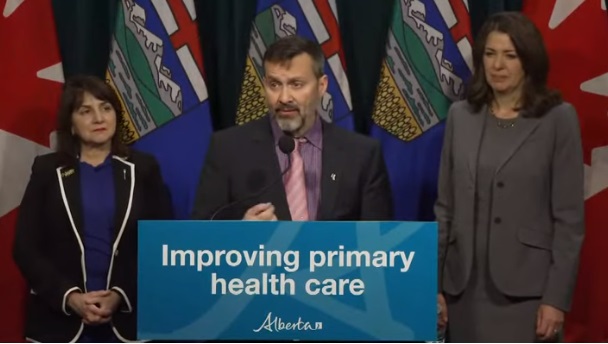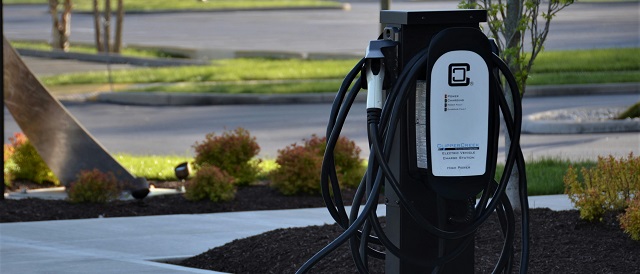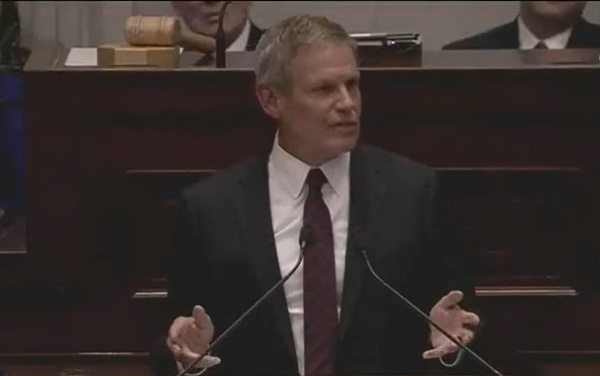Alberta
Massive funding boosts kick off Alberta’s transition to fully comprehensive care

Dr. Paul Parks, president, Alberta Medical Association
Canada signs more than $1 billion bilateral agreement with Alberta to improve health care over three years
From: Health Canada
This investment will increase access to a primary health provider, reduce wait times for mental health services, and provide greater access to health data.
Canadians want and deserve a health care system that provides timely access to health services whenever and wherever they are needed. That is why the Government of Canada is investing over $200 billion over 10 years, which includes $25 billion for tailored bilateral agreements with provinces and territories, to support the Working Together to Improve Health Care for Canadians plan.
Today, the Honourable Mark Holland, Canada’s Minister of Health, and the Honourable Adriana LaGrange, Alberta Minister of Health, announced a bilateral agreement to invest $1.06 billion over the next three years, marking a crucial step in a 10-year plan for collaboration. This includes $285 million per year in new funding by the Government of Canada and continuing $70 million per year in previously-announced mental health and substance use funding, which will help accelerate efforts already underway in Alberta to improve health care access and services.
Through this federal funding, Alberta has a three year action plan to deliver improvements to its health care system by 2026, including:
- Increasing access to primary care providers for Albertans and reducing emergency department visits that could have been addressed by a family medicine office. This will be achieved by expanding team-based care and enhancing virtual care, and increasing the number of appointments available to patients.
- Funding community providers to increase diagnostic imaging capacity in the province, reducing wait times for CT scans and MRIs.
- Improving patient care by enhancing Albertans’ ability to access digital health services and their own health information by implementing e-referral services and accelerating the secure exchange of data across the health system.
- Expanding integrated services for youth mental health services in the province through school-based and community day programs, and offering more supports for youth with complex needs as they transition into adult services.
- Reducing median wait times for community mental health and substance use services by establishing new and improving existing treatment spaces, along with prioritizing culturally appropriate Indigenous community supports.
- Ensuring that First Nations and Métis people have access to high-quality, culturally safe care that meets their unique health needs. This will be achieved through dedicated funding for initiatives to enhance access to primary care in Indigenous communities, and funding for communities to develop health workforce capacity and infrastructure to improve the collection and use of health information and data.
- Improving access to health care for underserved Albertans, including through expanded community pilots that bring testing services to rural, remote and Indigenous communities, advancing French-language health services, and greater clinical care for women.
Progress on these initiatives and broader commitments will be measured against targets which Alberta will publicly report on annually.
Through this new agreement, Alberta will improve how health information is collected, shared, used and reported to Canadians; streamline foreign credential recognition for internationally educated health professionals; facilitate the mobility of key health professionals within Canada; and fulfill shared responsibilities to uphold the Canada Health Act to protect Canadians’ access to health care that is based on need, not the ability to pay.
Recognizing the significant disparities in Indigenous health outcomes, the Government of Canada and the Government of Alberta also commit to meaningfully engage and work together with Indigenous partners to support improved access to quality and culturally appropriate health care services. Alberta’s action plan is informed by continued engagement with its Indigenous partners and recent discussions involving the federal government. All orders of government will approach health decisions in their respective jurisdictions through a lens that promotes respect and reconciliation with Indigenous Peoples.
Alberta and the federal government will continue working together to improve access to health services and deliver tangible results to all residents across the province, including responding to the needs of Indigenous and other underserved and disadvantaged populations.
Quotes
“Our government is working together with provinces and territories to get Canadians the healthcare they need. This agreement is an important step in our collaboration with Alberta to take measurable actions to transform our health care system. The funding will help improve access to primary care and create better mental health services in Alberta. Together, we will continue working to achieve better health outcomes for all Canadians.”
The Honourable Mark Holland
Minister of Health of Canada
“Mental health is health, and through this agreement, we will be working with Alberta to integrate mental health and substance use care as a full and equal part of our universal health care system. This agreement will strengthen the capacity of family health providers, reduce substance use harms, and expand virtual care for youth to improve access to quality and timely mental health care and substance use supports. Together, we must ensure that all Canadians have access to supports and services for their mental health and well-being – when they need them, wherever they need them.”
The Honourable Ya’ara Saks
Minister of Mental Health and Addictions and Associate Minister of Health of Canada
“Alberta’s government is taking a serious look at the way health care is being delivered in our province. This is why we are refocusing our health care system to ensure Albertans have access to timely care, when and where they need it. This initial funding from the federal government is a good start and will support our shared health priorities of expanding access to primary care across the province and especially in our Indigenous communities, supporting our health care workers, improving access to quality mental health, and modernizing our health systems.”
The Honourable Adriana LaGrange
Minister of Health of Alberta
“Alberta’s government is supporting Albertans to improve their mental health and recover from the deadly disease of addiction as we build out the Alberta Recovery Model and refocus our provincial healthcare system. We are doing this by increasing access to CASA Mental Health Classrooms across the province, building more bed based mental health treatment capacity for youth, and improving access to mental health and addiction treatment services in communities. This initial funding from the federal government will offer some support to these made in Alberta initiatives as we build a better system of mental health and addiction care for Albertans.”
The Honourable Dan Williams
Minister of Mental Health and Addiction of Alberta
Quick facts
- The Working Together investment includes $25 billion for tailored bilateral agreements with provinces and territories, a guaranteed 5% Canada Health Transfer (CHT) increase for the next five years—amounting to $17.5 billion—and a one time CHT $2 billion top-up to address urgent needs of emergency rooms and paediatric hospitals delivered in June 2023. Combined, these investments provide provinces and territories the flexibility to address the unique needs of their populations and geography, and accelerate health care system improvements.
- Budget 2023 outlined the Government of Canada’s plan to invest over $200 billion over 10 years, including $46.2 billion in new funding for provinces and territories, to improve health care for Canadians. Within this funding, $25 billion is allocated through tailored bilateral agreements to address the unique needs of their populations and geography in four shared health priorities:
- expanding access to family health services, including in rural and remote areas;
- supporting health workers and reducing backlogs;
- increasing mental health and substance use support; and
- modernizing health care systems with health data and digital tools.
- All provinces and territories are already making considerable investments to advance progress in all four of these priority areas, and the new federal funding is complementing and expanding those efforts.
- As part of these bilateral agreements, provinces and territories are developing action plans that outline how funds will be spent and how progress will be measured to demonstrate to Canadians that improvements are occurring in Canada’s health care system. Alberta’s initial 3-year Action Plan can be found here.
- Budget 2017 committed $11 billion over 10 years in federal funding to provinces and territories to improve access to home and community care, and mental health and addictions services for Canadians. Bilateral agreements were signed with provinces and territories to access the first six years of funding. The final four years of funding for mental health and addictions are included in the new Working Together bilateral agreements.
- The Government is also working with provinces and territories to implement a second bilateral agreement focused on helping Canadians age with dignity close to home, with access to home care or care in a safe long-term care facility. This agreement will include the remaining $2.4 billion over four years to improve access to home and community care from Budget 2017; and the $3 billion over five years for long-term care from Budget 2021 to apply standards of care in long-term care facilities and help support workforce stability.
———-
From the Province of Alberta
This funding will be an essential transitional step to ensure doctors can continue to provide this care as we rapidly transition to a funding model that supports fully comprehensive care.”
Dr. Paul Parks, president, Alberta Medical Association
New funding to stabilize primary health careStabilization funding is coming soon as Alberta’s government continues working to improve primary health care across the province. The government is pulling out all the stops to stabilize, strengthen and improve Alberta’s primary health care system. Additional funding of $200 million over two years will improve access to family physicians and help ensure primary health care is available for every Albertan when and where they need it. This funding is enabled through the new Canada-Alberta Health Funding Agreement with the federal government. The agreement represents a total of approximately $1.1 billion in additional health care funding over three years for shared priorities.
Stabilization funding is an important transitional measure identified through work under the memorandum of understanding (MOU) between the minister of health and the Alberta Medical Association (AMA), signed earlier this fall. The AMA has been advocating for family physicians and rural generalists through its work under the MOU. Alberta’s government will continue to engage with the AMA as it works to develop a new, sustainable physician comprehensive care model, which will also dictate how this additional funding will be distributed. In addition to work between the government and the AMA, the Comprehensive Care Task Force will, in the new year, provide a first draft of recommendations that will include additional short-term stabilization actions to help family doctors continue to practise comprehensive care and bridge the gap until a new physician comprehensive care model is developed. These short-term actions will:
Alberta’s government is committed to finalizing a sustainable physician comprehensive care model that will address the concerns of family physicians and rural generalists and ensure Albertans can access the care they need.
Other recently announced supports for primary health care include:
Related information |
Alberta
Canadian Christian chiropractor fights ‘illegal’ $65,000 fine for refusing to wear mask

From LifeSiteNews
Dr. Curtis Wall went against the College of Chiropractors of Alberta’s COVID mask mandate in 2020 and the organization has been pursuing disciplinary action ever since.
The legal team for Dr. Curtis Wall, a Canadian chiropractor who was recently fined $65,000 by his medical college for not wearing a mask in 2020 despite the fact public health orders last year were nullified by a court, has vowed to fight the “illegal” fine, saying that Wall was targeted because he is a “Christian man of integrity and principle.”
“Dr. Wall should not pay any fines or costs when the public health orders he was charged with not following have been declared void by the courts,” said Wall’s legal team, Liberty Coalition Canada (LCC), in a press release.
“He is a Christian man of integrity and principle — attributes that make him a target for government overreach in the era of COVID.”
Wall was practicing in Calgary in 2020 when the COVID crisis was gearing up, went against Alberta’s public health orders and chose not to wear a mask during patient visits. Many of his patients also decided to not wear masks during their visits, which quickly drew the ire of College of Chiropractors of Alberta, which had mandated that all chiropractors wear masks.
Wall, who has been seeing patients for the last 25 years with a pristine record, was then targeted by the College, which tried to strip him of his license to practice. The College was unable to strip Wall of his license and he continued to practice, sans mask in 2021 and 2022.
In 2021, the College had brought against Wall, as per the LCC, “a long list of charges of unprofessional conduct against Dr. Wall, most of which related to Dr. Wall not wearing a mask while treating patients and permitting his patients to not wear a mask.”
Wall was then brought before a disciplinary hearing Tribunal to mediate his case, which went well into 2022, and had placed a publication ban on all “identities of all witnesses,” including Wall’s.
James Kitchen, Wall’s lawyer from the LCC, was successful in getting the publication ban lifted, as the LCC noted due to the College “wishing to avoid likely defeat before the courts” regarding keeping the ban in place.
Fined chiropractor says college did not recognize his ‘Christian convictions’
In 2023, the Tribunal ruled against Wall entirely and in favor of the College.
The Tribunal’s decision noted the LCC is “riddled with errors of fact and law and is so poorly decided it is an embarrassment to the chiropractic profession.”
Wall spoke with LifeSiteNews and observed that while in his point of view he does not feel his fines and costs imposed on him by the college “are a direct result of my Christian faith,” he did note that the tribunal did “not recognize my honest Christian convictions as a valid reason for my not wearing a mask.”
“They put placed no merit in the argument that as a Christian I believe I am created in the image of God,” Wall said.
“My face is an expression of Him. Having man arbitrarily mandate that I cover my face is an affront to that expression and signifies that I am living in the fear of man, not by faith. So, in all, I don’t feel directly persecuted as a Christian, but certainly indirectly.”
Wall told LifeSiteNews that in his opinion the college could have “handled this issue much differently.”
“There must always be room for exceptions to a rule. I did present a doctor’s note to verify my inability to wear a mask. They did not place any weight on that note. They blamed me for ‘self-diagnosing’ my problem,” Wall said.
“Number one, I’m a doctor. I think eight years of schooling has given me some wisdom to diagnose my own signs and symptoms. Number two, if someone eats a peanut and their throat swells shut, can they not diagnose themselves and stay away from nuts? It’s not a problem to self-diagnose.”
Wall said that despite his legal team presenting four expert witnesses to demonstrate “the obvious inadequacy and lack of efficacy in mask-wearing, not to mention the harms as well,” the college “did not cite the record once in their verdict.”
He noted that “common sense, science and past and present studies overwhelmingly demonstrate” the lack of efficacy regarding mask-wearing.
The LCC noted that although both Kitchen and Wall hoped for an “unbiased decision from the tribunal,” they knew it was more “likely the tribunal members would lack the courage to oppose the government’s COVID narrative by accepting the scientific evidence masks are utterly ineffective at preventing the transmission of COVID and harmful to wearers.”
“Nonetheless, it is shocking the lengths the tribunal went to dismiss the evidence of Dr. Wall, three of his patients, and his four expert witnesses while blithely accepting all the evidence of the College.”
Wall’s charges laid despite a recent court ruling nullifying all Alberta COVID health orders
According to LCC, the charges brought against Wall show that the College of Chiropractors of Alberta has “ignored the law” relating to non-criminal COVID-era charges handed out in the province.
As reported by LifeSiteNews before, last year a judge from Alberta ruled that politicians violated the province’s health act by making decisions regarding COVID mandates without authorization. This ruling came from the Alberta’s Court of Kings Bench’s Ingram v. Alberta decision, which put into doubt all cases involving those facing non-criminal COVID-related charges in the province. In effect, the ruling struck down and nullified all health orders issued by Dr. Deena Hinshaw, Alberta’s former chief medical officer of health.
As a result, multiple people facing charges, such as Dr. Michal Princ, pizzeria owner Jesse Johnson, café owner Chris Scott, and Alberta pastors James Coates, Tim Stephens, and Artur Pawlowski who were jailed for keeping churches open under then-Premier Jason Kenney, have had COVID charges against them dropped due to the court ruling.
The Alberta’s Court of Kings Bench’s Ingram v. Alberta decision put into doubt all cases involving those facing non-criminal COVID-related charges in the province.
As a result of the court ruling, Alberta Crown Prosecutions Service (ACPS) said Albertans facing COVID-related charges will likely not be convicted but instead have their charges stayed.
However, last year, the College, and of important note after the Ingram ruling, ordered Wall to pay $65,000 in fines and costs “under threat of immediately losing his license to practice if he does not pay,” the LCC said.
Chiropractor’s lawyer to fight fine tooth and nail
According to the LCC, the College’s new complaints director said she will enforce the tribunal’s court-defying order and mandate Wall pay the $65,000.
Because of this, Kitchen submitted an application to the College “to prevent this injustice” against Wall, the LCC noted.
“The Application will be heard on June 21. It will be heard virtually and is open to public, although the College has erected a number of barriers to people attending its hearings. For one, people must register with the hearings director and must do so many days in advance,” he told LifeSiteNews.
“The Tribunal elected to ignore the Ingram decision despite issuing its decision over two weeks after Ingram was released by the Court.”
Kitchen noted that the Tribunal had a lawyer advising it who was being paid some $700 an hour. He told LifeSiteNews that “Tribunals can do whatever they want and often do.”
“Only if the affected person takes further legal action can they hold the Tribunals accountable. And even then, that’s very difficult because the first appeals are to the councils of the Colleges, which almost always rubber stamp whatever the Tribunals decide. Real accountability isn’t had until the impugned professional is able to reach the Court of Appeal, which of course takes years and an enormous amount of funding for lawyer fees,” Kitchen said.
Kitchen is working Wall’s case at discounted rates and noted that high legal costs in such cases dealing with tribunals, who can drag things on for years, to him appear to be a tactic the Colleges count on for “avoiding accountability.”
The LCC estimates the College, which is funded through payments from all chiropractors, paid some $600,000 in legal fees to fight Wall.
“LCC asks supporters to donate toward Dr. Wall’s case so he and Mr. Kitchen can hold the College of Chiropractors of Alberta accountable and bring an end to the unjust persecution of Dr. Curtis Wall. Liberty Coalition Canada is assisting Dr. Wall with his legal expenses through the Legal Defense Fund.”
Kenney quit after losing the confidence of his United Conservative Party (UCP) members for backtracking on his promise to not impose a COVID vaccine passport. Under Kenney, thousands of businesses, notably restaurants and small shops, were negatively impacted by severe COVID restrictions, mostly in 2020-21, that forced them to close their doors for a time. Many never reopened. At the same time, as in the rest of Canada, big box stores were allowed to operate unimpeded.
Under Kenney, thousands of nurses, doctors, healthcare and government workers lost their jobs for choosing to not get the jabs, leading Premier Danielle Smith to say – only minutes after being sworn in – that over the past year the “unvaccinated” were the “most discriminated against” people in her lifetime.
Recently, LifeSiteNews reported on how Alberta-based Rath & Company is in the process of putting together a class-action lawsuit against the Alberta government on behalf of many business owners in the province who faced massive losses or permanent closures from what it says were “illegal” COVID public health orders enacted by provincial officials.
Alberta
Game changer: Trans Mountain pipeline expansion complete and starting to flow Canada’s oil to the world

Workers complete the “golden weld” of the Trans Mountain pipeline expansion on April 11, 2024 in the Fraser Valley between Hope and Chilliwack, B.C. The project saw mechanical completion on April 30, 2024. Photo courtesy Trans Mountain Corporation
From the Canadian Energy Centre
By Will Gibson
‘We’re going to be moving into a market where buyers are going to be competing to buy Canadian oil’
It is a game changer for Canada that will have ripple effects around the world.
The Trans Mountain pipeline expansion is now complete. And for the first time, global customers can access large volumes of Canadian oil, with the benefits flowing to Canada’s economy and Indigenous communities.
“We’re going to be moving into a market where buyers are going to be competing to buy Canadian oil,” BMO Capital Markets director Randy Ollenberger said recently, adding this is expected to result in a better price for Canadian oil relative to other global benchmarks.
The long-awaited expansion nearly triples capacity on the Trans Mountain system from Edmonton to the West Coast to approximately 890,000 barrels per day. Customers for the first shipments include refiners in China, California and India, according to media reports.
Shippers include all six members of the Pathways Alliance, a group of companies representing 95 per cent of oil sands production that together plan to reduce emissions from operations by 22 megatonnes by 2030 on the way to net zero by 2050.
The first tanker shipment from Trans Mountain’s expanded Westridge Marine Terminal is expected later in May.
 Photo courtesy Trans Mountain Corporation
Photo courtesy Trans Mountain Corporation
The new capacity on the Trans Mountain system comes as demand for Canadian oil from markets outside the United States is on the rise.
According to the Canada Energy Regulator, exports to destinations beyond the U.S. have averaged a record 267,000 barrels per day so far this year, up from about 130,000 barrels per day in 2020 and 33,000 barrels per day in 2017.
“Oil demand globally continues to go up,” said Phil Skolnick, New York-based oil market analyst with Eight Capital.
“Both India and China are looking to add millions of barrels a day of refining capacity through 2030.”
In India, refining demand will increase mainly for so-called medium and heavy oil like what is produced in Canada, he said.
“That’s where TMX is the opportunity for Canada, because that’s the route to get to India.”
Led by India and China, oil demand in the Asia-Pacific region is projected to increase from 36 million barrels per day in 2022 to 52 million barrels per day in 2050, according to the U.S. Energy Information Administration.
More oil coming from Canada will shake up markets for similar world oil streams including from Russia, Ecuador, and Iraq, according to analysts with Rystad Energy and Argus Media.
Expanded exports are expected to improve pricing for Canadian heavy oil, which “have been depressed for many years” in part due to pipeline shortages, according to TD Economics.
 Photo courtesy Trans Mountain Corporation
Photo courtesy Trans Mountain Corporation
In recent years, the price for oil benchmark Western Canadian Select (WCS) has hovered between $18-$20 lower than West Texas Intermediate (WTI) “to reflect these hurdles,” analyst Marc Ercolao wrote in March.
“That spread should narrow as a result of the Trans Mountain completion,” he wrote.
“Looking forward, WCS prices could conservatively close the spread by $3–4/barrel later this year, which will incentivize production and support industry profitability.”
Canada’s Parliamentary Budget Office has said that an increase of US$5 per barrel for Canadian heavy oil would add $6 billion to Canada’s economy over the course of one year.
The Trans Mountain Expansion will leave a lasting economic legacy, according to an impact assessment conducted by Ernst & Young in March 2023.
In addition to $4.9 billion in contracts with Indigenous businesses during construction, the project leaves behind more than $650 million in benefit agreements and $1.2 billion in skills training with Indigenous communities.
Ernst & Young found that between 2024 and 2043, the expanded Trans Mountain system will pay $3.7 billion in wages, generate $9.2 billion in GDP, and pay $2.8 billion in government taxes.
-

 conflict2 days ago
conflict2 days ago‘Got Played’: Israel Reportedly Suspicious Biden Admin Had Backroom Talks With Mediators Over Ceasefire Deal
-

 Fraser Institute2 days ago
Fraser Institute2 days agoTrudeau and Ford should attach personal fortunes to EV corporate welfare
-

 John Stossel1 day ago
John Stossel1 day agoThe Swamp Survived: Why Trump Failed to “Drain the Swamp”
-

 Alberta2 days ago
Alberta2 days agoCanadian Christian chiropractor fights ‘illegal’ $65,000 fine for refusing to wear mask
-

 Energy1 day ago
Energy1 day agoU.S. EPA Unveils Carbon Dioxide Regulations That Could End Coal and Natural Gas Power Generation
-

 Opinion23 hours ago
Opinion23 hours agoBoy Scouts of America changes name to ‘Scouting America’ to be ‘more inclusive’
-

 Media2 days ago
Media2 days agoCBC tries to hide senior executive bonuses
-

 Automotive13 hours ago
Automotive13 hours agoNew Analysis Shows Just How Bad Electric Trucks Are For Business









